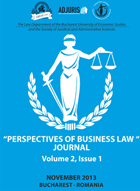BRIEF CONSIDERATIONS ON THE WARANT, AS REPRESENTATIVE TITLE OF GOODS IN WAREHOUSES, ANALYZED FROM THE PERSPECTIVE OF ITS
FUNCTION OF PAYMENT INSTRUMENT, IN THE LIGHT OF SPECIAL REGULATIONS AND PROVISIONS OF THE NEW CIVIL CODE
BRIEF CONSIDERATIONS ON THE WARANT, AS REPRESENTATIVE TITLE OF GOODS IN WAREHOUSES, ANALYZED FROM THE PERSPECTIVE OF ITS
FUNCTION OF PAYMENT INSTRUMENT, IN THE LIGHT OF SPECIAL REGULATIONS AND PROVISIONS OF THE NEW CIVIL CODE
Author(s): Alexandru BulearcăSubject(s): Law, Constitution, Jurisprudence
Published by: Societatea de Stiinte Juridice si Administrative
Keywords: payment instruments; payment services; deposit contract; the warrant
Summary/Abstract: In terms of terminology, both the doctrine and national regulation or community law are making confusion between the terms „payment instruments” and „means of payment” when they need to designate the document through which is made the payment to a pecuniary obligation by the debtor. In order to highlight the legal status of warant as payment tool of international trade law has been used both the method of comparative law and rules of interpretation specific to the international trade law science, and rules of interpretation common to all branches of law, including commercial and banking law. Thus, in a first perspective was considered the concept of “instrumentum” according to which as long as the document by which is made the payment of a pecuniary obligation relating to a legal relationship with a foreign element is a document, either on a material support or dematerialized, we hold that the appropriate term to describe this is payment instrument and not means of payment, because the latter means, on the one hand,how the payment is made, and on the other hand, international liquidity - in currency - used in economic exchanges. From another perspective, have been considered the proposals to update national legislation both in terms of financial and banking practice set globally and the progress made in information technology, widely used to achieve cross-border payments.
Journal: Perspectives of Business Law Journal
- Issue Year: 2013
- Issue No: 02
- Page Range: 46-52
- Page Count: 7
- Language: English

